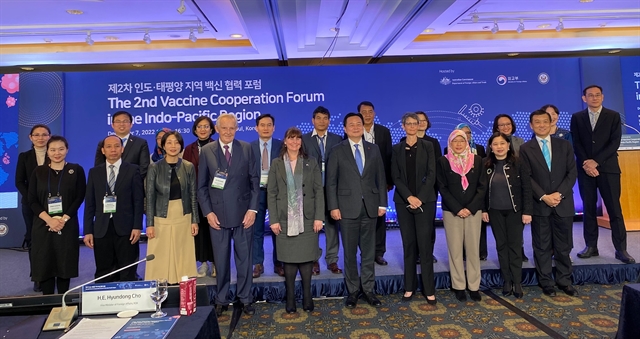 Society
Society

 |
| Participants pose for a group photo on the sideliens of the forum. —VNS Photo Khánh Vân |
SEOUL — Health experts and senior officers from different countries called for vaccine cooperation and partnership to strengthen resilience and preparedness for future pandemics at the second vaccine cooperation forum in the Indo-Pacific Region, which opened in Seoul, the Republic of Korea, on December 7.
Participants discussed measures to ensure vaccine security, equity, resilience building, and promote vaccine partnerships in the Indo-Pacific region.
First Vice Foreign Minister of Korea Cho Hyun-dong said in his opening speech that over the years, cooperation between ASEAN and the Republic of Korea had developed remarkably, covering a wide range of areas, including collective response to the challenges of the COVID-19 pandemic.
He stressed the importance of strengthening regional vaccine cooperation for improved preparedness and resilience against future pandemics.
"We have learned the effectiveness of collective response and the importance of equitable access to actions and treatment regionally," said Cho Hyun-dong.
He added that ASEAN quickly harnessed collective efforts and launched the COVID-19 ASEAN Response Fund and the ASEAN Regional Reverse of Medical Supplies, making a rapid regional-wide response possible.
Dr Sunate Chuenkitmongkol, Deputy Director of the Thai National Vaccine Institute, said vaccine security is timely, sustainable and uninterrupted supply of affordable vaccines of assured quality.
She suggested ensuring vaccine security through vaccine procurement, research and development, information sharing and knowledge management, human resource development and networking.
Deputy Coordinator for Global COVID-19 Response and Health Security under the US Department of State Laura Stone that the US valued partnerships established in the region. The US has donated over 670 million doses of the COVID-19 vaccine to 115 countries, including 26 in South and East Asia.
She pointed to the need to coordinate various efforts to ensure sustainable and long-term vaccine partnerships and to keep working on the remaining challenges, including low vaccine competence and continued inequality.
Dr Hoàng Hoa Sơn, Head of the Science and Technology Management Division under the Ministry of Health's Department of Science and Technology, said Việt Nam had implemented multi-channels to ensure vaccine supply, including promoting vaccine diplomacy.
Việt Nam has administered more than 264 million COVID-19 vaccines, he said.
The Government of Việt Nam issued Resolution No 104 on the roadmap to increase the diversity of vaccines in the Expanded Immunisation Programme during the 2021-2030 period.
Sơn told a Việt Nam News reporter on the forum's sidelines that promoting vaccine cooperation among countries is essential to ensuring vaccine security, including information sharing, technology transfer and human resources training. However, choosing appropriate models of cooperation and mechanisms is also necessary to ensure cooperation efficiency and equity among all members.
Việt Nam currently has four vaccine manufacturing factories but they face many challenges, such as small-scale production, a lack of advanced technology and qualified human resources and the need to set up an organisation or institute and mechanism that can coordinate, he said. — VNS




